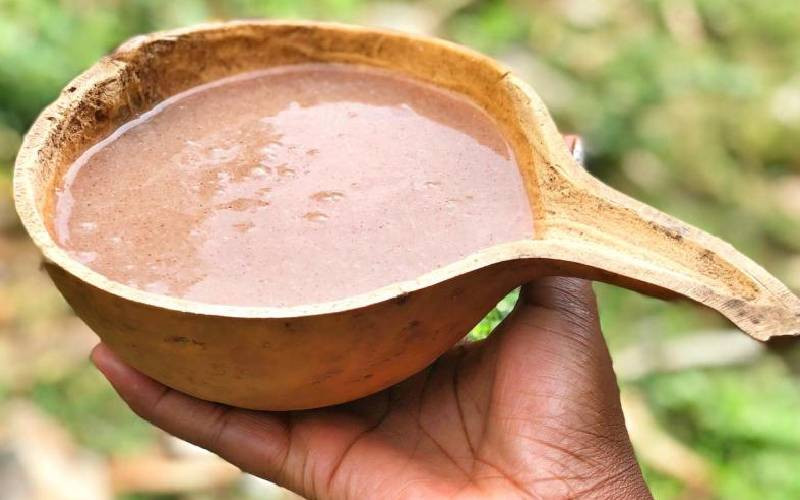The calabash is a gift from nature. It’s derived from a gourd.
It is a container for water and other liquids, and a traditional plate or cup when cut into two.
It has stood the test of time. It co-existed with traditions like ngurario, vukwii, nyombo, ruracio, ntheo, among others.
The calabash and gourds are part and parcel of traditions tied to proverbs. An example from Duruma along the Kenyan coast given by University don Mohamed Mwachiti is “udzitia mkono chipangalani, undakakatwa,” meaning you have created a problem that will consume you.
Follow The Standard
channel
on WhatsApp
Direct translation: Your hand will be severed since you put it in the calabash!
Caroline Mutua from Kyaume village in Tala adds: “Kasele katune katunivaw’a ni ùnengeleaniwa.”
The Kamba proverb translates to “a calabash bowl becomes smoother when it’s passed on, one person to another.“
It encourages sharing values and building great things together.” In Kiambu, “Nyanja imwe nditiragia itega.”
One gourd of traditional beer will not stop a ceremony. Simply put, no one is indispensable. Share your
“calabash or gourd” proverbs from your community. I used to see calabashes and gourds on sale along the highways. That golden era is gone.
We now have plastic calabashes. Has the manufacturer patented it? The new calabash has a base and can stand on its own.
That was the core of its innovation. It can’t break easily, and packaging is easier. It is probably cheaper.
The traditional calabash is scarce; its plant grows in a few regions. Curiously, I found my first plastic calabash in a golf course in Nairobi, not in a ngurario or nyombo.
The plastic calabash follows the silent shift from organic to artificial products. We now have plastic chairs, cups, spoons, cups, tables, and other household products.
Even cars and aeroplanes have plastics. Only coffins have resisted plastics. The calabash, like the traditions it represents, held for too long. Will our traditions also become “plastic” like the calabash? A good example of how long will dowry hold?
The replacement of the calabash is a reminder that most innovations mimic or copy nature. Even ChatGPT, Facebook, and WhatsApp are about how we speak and converse.
Does Schumpeter’s creative destruction cover natural products replaced by artificial ones? Can genetic engineers respond? Should we celebrate or weep over the “death” of the calabash?
Follow The Standard
channel
on WhatsApp
The calabash is a gift from nature. It’s derived from a gourd.
It is a container for water and other liquids, and a traditional plate or cup when cut into two.
It has stood the test of time. It co-existed with traditions like ngurario, vukwii, nyombo, ruracio, ntheo, among others.
The calabash and gourds are part and parcel of traditions tied to proverbs. An example from Duruma along the Kenyan coast given by University don Mohamed Mwachiti is “udzitia mkono chipangalani, undakakatwa,” meaning you have created a problem that will consume you.
Follow The Standard
channel
on WhatsApp
Direct translation: Your hand will be severed since you put it in the calabash!
Caroline Mutua from Kyaume village in Tala adds: “Kasele katune katunivaw’a ni ùnengeleaniwa.”
The Kamba proverb translates to “a calabash bowl becomes smoother when it’s passed on, one person to another.“
It encourages sharing values and building great things together.” In Kiambu, “Nyanja imwe nditiragia itega.”
One gourd of traditional beer will not stop a ceremony. Simply put, no one is indispensable. Share your
“calabash or gourd” proverbs from your community. I used to see calabashes and gourds on sale along the highways. That golden era is gone.
We now have plastic calabashes. Has the manufacturer patented it? The new calabash has a base and can stand on its own.
That was the core of its innovation. It can’t break easily, and packaging is easier. It is probably cheaper.
The traditional calabash is scarce; its plant grows in a few regions. Curiously, I found my first plastic calabash in a golf course in Nairobi, not in a ngurario or nyombo.
The plastic calabash follows the silent shift from organic to artificial products. We now have plastic chairs, cups, spoons, cups, tables, and other household products.
Even cars and aeroplanes have plastics. Only coffins have resisted plastics. The calabash, like the traditions it represents, held for too long. Will our traditions also become “plastic” like the calabash? A good example of how long will dowry hold?
Stay informed. Subscribe to our newsletter
The replacement of the calabash is a reminder that most innovations mimic or copy nature. Even ChatGPT, Facebook, and WhatsApp are about how we speak and converse.
Does Schumpeter’s creative destruction cover natural products replaced by artificial ones? Can genetic engineers respond? Should we celebrate or weep over the “death” of the calabash?
Follow The Standard
channel
on WhatsApp
By XN Iraki


